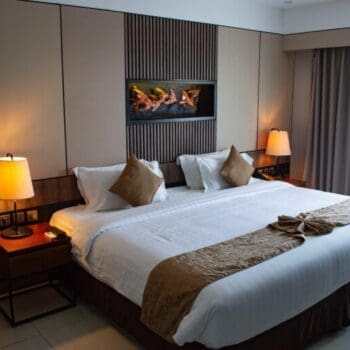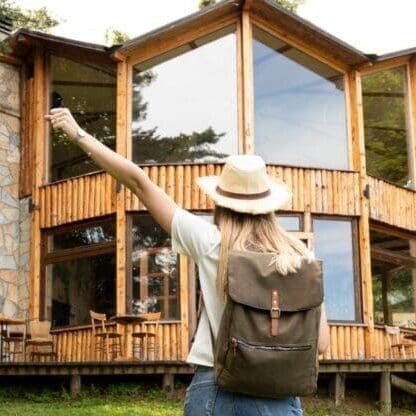 Hotel inventory management is commonly split between two sub-categories: primary inventory and secondary inventory. As a hotel’s main asset, rentable rooms make up the primary inventory while secondary inventory consists of everything else that hotels offer such as restaurants, spas, extra services, and room supplies. Proper management of both of these inventories is key to a hotel’s success.
Hotel inventory management is commonly split between two sub-categories: primary inventory and secondary inventory. As a hotel’s main asset, rentable rooms make up the primary inventory while secondary inventory consists of everything else that hotels offer such as restaurants, spas, extra services, and room supplies. Proper management of both of these inventories is key to a hotel’s success.
Unrented rooms and unused or unwanted amenities represent inventory waste to hoteliers that results in profit-lowering costs. They also represent environmental waste that can both deplete natural resources and create additional rubbish for landfills. In this way, effective inventory management is a winning strategy for hoteliers and the world at large.
This article will examine ways hotels can minimize secondary inventory waste in their rooms in order to reduce costs, increase profits, and promote sustainability.
Appliances and energy consumption
will examine ways hotels can minimize secondary inventory waste in their rooms in order to reduce costs, increase profits, and promote sustainability.
Hotel rooms are equipped with a wide array of appliances from standards like lamps, hair dryers, and TVs to more novel items like high-speed internet, coffee machines, and mini-fridges. These appliances are valuable amenities in that they can make or break a guest’s stay. But they are also costly sources of energy consumption for hoteliers and the planet.
One sustainable option for hotels is to adopt energy-saving key card systems that turn electricity off when guests are not in their rooms. Hotels with power controls and these systems report as much as a 30% reduction in electricity usage. This largely cuts down on unnecessary power usage and bills.
Another option for hotels to become more energy efficient is to purchase smart appliances and solar energy panels. Though these represent a significant upfront cost, these devices should save money and energy over their lifetimes. Of course, friendly signage and reminders for guests to turn off unused devices can also save energy and are a relatively low-cost option that can be used in conjunction with any of these methods to save power.
Furniture and linens
Furniture and linens make up hotels’ largest physical inventory and expenses. Damaged bed frames, dressers, desks, bedding, and towels must be repaired or replaced and on occasion, the whole stock must be turned over in order to update the hotel. On each of these occasions, moving and replacing the stock of furniture and linens becomes both a large expense and a great opportunity.
In order to cut costs and support sustainability, hotels can recycle and resell obsolete inventories of room furnishings. If the furniture or linens being replaced are in good condition, consignment or reselling at a discount to other furnishing stores is a great option to recoup costs. If the stock is in poor condition it can be sold to scrap dealers and upcyclers or donated or recycled to reduce waste.
Some examples of hotels with repurposed furniture include Conscious Hotels in Amsterdam and the Netherlands as well as Sokos Hotels across Western Europe. Conscious Hotels, along with many other sustainable initiatives, have shelves made from compressed linens and clothes that form cupboards in their lobbies. Sokos Hotels in a large-scale renovation reupholstered some of their furniture to match the new look, renewed old linens through a Finnish company, and dismantled old furniture for recycling. These initiatives saved thousands of furnishings from ending up in landfills.
Personal care and toiletries
Personal care items and toiletries are some of the most used and expected amenities guests receive in hotels. Combs, toothbrushes, soaps, shampoos, razors, etc. make for a more comfortable stay and a better experience for guests. However, as commonly single-use items, they contribute a lot of trash in landfills and represent a steady expense to hoteliers.
In this way, it’s important for hotels to provide these amenities through eco-friendly means. Some options for reducing single-use plastic are providing refillable soap and bathroom amenities and replacing complimentary water bottles with refillable cups. Another option is to utilize more sustainable materials like bamboo or paper instead of plastic for single-use items.
Since personal care items make up an integral part of hotels’ daily inventories, it is important to note changes will require foresight and feedback. Consider gathering adequate guest and staff feedback and trying a small-scale trial before implementing and communicating process changes to amenities. This will ensure sustainable initiatives for toiletries and personal care items are accepted by guests and supported by staff members.
Conclusion
Inventory waste significantly costs both hoteliers and the environment. Unused or unwanted amenities result in additional energy, production, and purchase costs for hoteliers. They also cost the environment in the form of natural resource consumption and waste creation.
For these reasons, sustainability is a winning strategy for hotel inventory management. Sustainable initiatives in energy consumption, furniture and linen usage, and personal care amenities minimize waste thereby saving hotels unnecessary expenses. So to reap the benefits of reduced waste and increased profits, hoteliers across the world should prioritize sustainability in their inventory management.

































